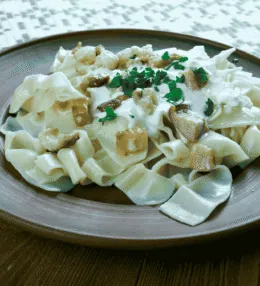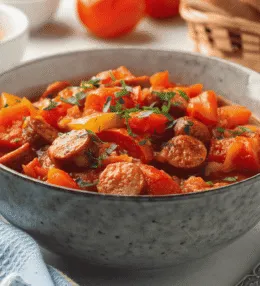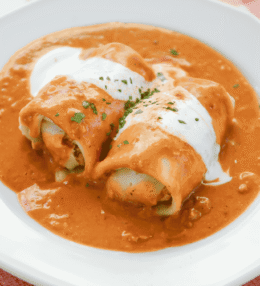
- View
Table of Contents
TogglePolvo à Lagareiro is a celebrated Portuguese seafood dish known for its tender octopus and rich olive oil flavour. It is a recipe that thrives on simplicity, allowing quality ingredients and careful preparation to shine through without distraction.
The octopus is roasted until each piece is supple and infused with seasoning. Potatoes accompany it, split open so their soft centres soak up the olive oil and garlic. The result is a dish that feels generous and deeply satisfying.
Its appeal comes from the harmony of texture and flavour. The octopus is delicate yet firm, the potatoes earthy and comforting, and the olive oil ties them together in a warm, fragrant embrace.
Want to dive deeper into Portuguese Cuisine? Don’t miss our post on 38 Traditional Portuguese Foods to Try
What Is Polvo à Lagareiro?
Polvo à Lagareiro is essentially roasted octopus served with small potatoes that have been lightly crushed and baked until crisp. The whole plate is finished with a generous pour of olive oil and often sprinkled with fresh herbs.
The octopus is first boiled gently until tender, then roasted to develop a slight char. This dual cooking method ensures it is soft inside with a delicate bite on the outside, creating a texture that draws people back for more.
The name Lagareiro refers to the olive oil mill workers, hinting at the dish’s signature ingredient. The oil is not just for flavour but for richness, giving every bite a smooth and satisfying finish.
Ingredients and Taste
The main ingredient is fresh octopus, preferably caught along the Portuguese coast where the waters lend it a natural sweetness. Olive oil of high quality is essential, as it forms the backbone of the flavour.
Garlic is used generously, infusing the oil and coating the octopus and potatoes with an aromatic warmth. Fresh parsley adds a light herbal note, while coarse sea salt enhances the natural taste of the seafood.
The flavour is a mix of briny, earthy, and fragrant. The octopus is tender and subtly sweet, the potatoes crisp at the edges, and the olive oil rich and fruity. It is hearty yet elegant, with each element in harmony.
A Taste of History
Polvo à Lagareiro reflects Portugal’s deep connection to the sea and its olive growing traditions. It is believed to have roots in rural communities where olive oil was plentiful and seafood part of the daily diet.
In fishing villages, octopus was once considered humble fare, valued for its abundance and versatility. Over time, its preparation evolved into something more refined, worthy of festive tables and special gatherings.
The dish’s association with olive oil mill workers is a nod to its rustic past. At the end of the harvest season, it was common to celebrate with simple yet generous meals, and this preparation fit the occasion perfectly.
Today, Polvo à Lagareiro is a staple of Portuguese cuisine, appearing on menus from seaside cafés to high-end restaurants. It remains a dish that celebrates both the land and the sea, uniting tradition with timeless flavour.
How to Make Polvo à Lagareiro (Roasted Octopus)
Polvo à Lagareiro is a beloved Portuguese seafood dish where tender octopus is roasted with garlic infused olive oil and potatoes until the edges crisp. The slow preparation rewards you with succulent meat and rich, aromatic flavours. See the recipe card at the bottom for printable directions
Ingredients
For the octopus
- 1.5–2 kg fresh or frozen octopus, cleaned
- 1 onion, peeled and halved
- 2 bay leaves
- 1 tsp sea salt
For the potatoes
- 800g small new potatoes, skin on
- 3 tbsp coarse sea salt
For roasting
- 150ml extra virgin olive oil (preferably Portuguese)
- 6 garlic cloves, crushed slightly
- 1 tbsp fresh parsley, finely chopped
- Freshly ground black pepper, to taste
Cooking Instructions
Step 1: Prepare the octopus
To begin, place the octopus in a large pot with the halved onion, bay leaves, and salt. Cover with water and bring to a gentle boil. Reduce to a simmer and cook for 40–50 minutes until the octopus is tender when pierced with a fork. Transition to preheating the oven.
Step 2: Preheat the oven
Set the oven to 200°C (fan 180°C). This high heat will help achieve the signature golden edges in the final roast. Move on to preparing the potatoes.
Step 3: Cook the potatoes
In a separate pot, boil the potatoes in salted water for 15–20 minutes until just tender. Drain and allow them to steam dry for a few minutes. Prepare to lightly crush them next.
Step 4: Lightly crush the potatoes
Place the potatoes on a baking tray lined with parchment. Gently press each one with the back of a spoon or your palm to split the skin slightly, allowing the oil and garlic to seep in during roasting. Proceed to preparing the garlic oil.
Step 5: Infuse the olive oil
In a small pan over low heat, warm the olive oil with crushed garlic until fragrant but not browned. This infuses the oil without losing the fresh flavour of the garlic. Transition to assembling for roasting.
Step 6: Assemble in the roasting dish
Arrange the cooked octopus on a large roasting tray alongside the crushed potatoes. Drizzle generously with the garlic infused olive oil, season with black pepper, and sprinkle with chopped parsley. Move to roasting.
Step 7: Roast until golden
Place the tray in the preheated oven and roast for 20–25 minutes, turning the octopus halfway through to ensure even crisping. Continue until the potatoes are golden and the octopus edges caramelised. Proceed to final garnishing.
Final Step: Serve hot
Transfer to a warm serving platter, spooning over any remaining oil from the tray. Serve immediately with crusty bread for dipping and a crisp green salad for balance. Presentation tip: Arrange the octopus tentacles in a natural curve to highlight their texture.
Variations and substitutions
- If fresh clams are unavailable, substitute with high-quality frozen clams, thawed before use.
- Replace coriander with flat-leaf parsley for a milder herbal note.
- Use fish stock instead of white wine for a non-alcoholic version.
- Add a pinch of dried chilli flakes for gentle heat.
Cooking Tips for Perfect Polvo à Lagareiro
- Freezing and thawing the octopus before cooking naturally tenderises it.
- Always simmer octopus gently; boiling too hard will toughen the meat.
- Crushing potatoes before roasting allows them to soak up more garlic oil.
- For an extra crisp finish, switch the oven to grill mode for the last 2–3 minutes.

Portuguese Polvo à Lagareiro (Roasted Octopus)
Ingredients
For the octopus
- 1.5 –2 kg fresh or frozen octopus cleaned
- 1 onion peeled and halved
- 2 bay leaves
- 1 tsp sea salt
For the potatoes
- 800 g small new potatoes skin on
- 3 tbsp coarse sea salt
For roasting
- 150 ml extra virgin olive oil preferably Portuguese
- 6 garlic cloves crushed slightly
- 1 tbsp fresh parsley finely chopped
- Freshly ground black pepper to taste
Instructions
- To begin, place the octopus in a large pot with the halved onion, bay leaves, and salt. Cover with water and bring to a gentle boil. Reduce to a simmer and cook for 40–50 minutes until the octopus is tender when pierced with a fork. Transition to preheating the oven.
- Set the oven to 200°C (fan 180°C). This high heat will help achieve the signature golden edges in the final roast. Move on to preparing the potatoes.
- In a separate pot, boil the potatoes in salted water for 15–20 minutes until just tender. Drain and allow them to steam dry for a few minutes. Prepare to lightly crush them next.
- Place the potatoes on a baking tray lined with parchment. Gently press each one with the back of a spoon or your palm to split the skin slightly, allowing the oil and garlic to seep in during roasting. Proceed to preparing the garlic oil.
- In a small pan over low heat, warm the olive oil with crushed garlic until fragrant but not browned. This infuses the oil without losing the fresh flavour of the garlic. Transition to assembling for roasting.
- Arrange the cooked octopus on a large roasting tray alongside the crushed potatoes. Drizzle generously with the garlic infused olive oil, season with black pepper, and sprinkle with chopped parsley. Move to roasting.
- Place the tray in the preheated oven and roast for 20–25 minutes, turning the octopus halfway through to ensure even crisping. Continue until the potatoes are golden and the octopus edges caramelised. Proceed to final garnishing.
- Transfer to a warm serving platter, spooning over any remaining oil from the tray. Serve immediately with crusty bread for dipping and a crisp green salad for balance. Presentation tip: Arrange the octopus tentacles in a natural curve to highlight their texture.
Nutrition
You May Also Like











Leave a Review